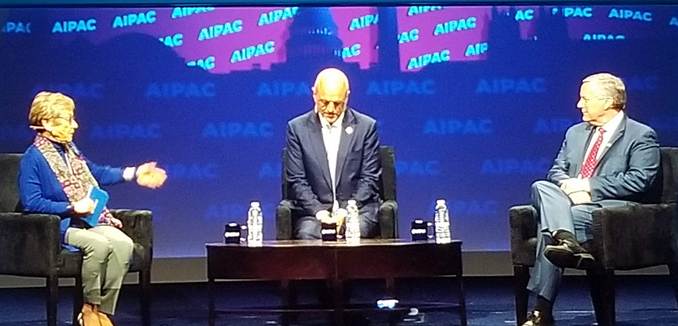One of the perks of my current career has been the opportunity and privilege to attend the annual AIPAC policy conference. In 2019, I attended my fourth consecutive gathering.
There are always thrills of seeing old friends and colleagues or attending fascinating breakout sessions on important topics given by experts in their fields.
Aside from those particular reasons I enjoy AIPAC, there’s also the significance of what AIPAC represents. AIPAC represents the broad support Israel enjoys across party, religious, and ethnic lines in the United States. And frankly, it’s a joy to witness this level of support.
Meghan McCain, daughter of the late Sen. John McCain (R – Ariz.), perhaps described this phenomenon best when she said: “Americans do not support Israel because AIPAC is influential, AIPAC is influential because Americans support Israel.”
From what I’ve witnessed at AIPAC, this is correct.
When you think about it, it’s incredible that thousands of Americans pay hundreds of dollars to attend. And if they’re not driving distance, they’re paying hundreds of dollars more for transportation and lodging. That reflects an incredible commitment.
And those attending are also well-versed in the issues. Emily Landau, the head of arms control program at Israel’s Institute for National Security Studies, tweeted, “My first event at #aipac2019 was a conversation about Iran nuclear with senate club members. Great audience – knowledgeable and engaged! @INSSIsrael @aipac.”
Recently, in the wake of Rep. Ilhan Omar’s (D – Minn.) comments accusing Jews of having “allegiance to a foreign country,” New York Times columnist Thomas Friedman responded that while he was “suspicious” of Omar’s motives, he, like her, doesn’t like AIPAC.
He asserted that AIPAC has “become a rubber stamp on the right-wing policies of Prime Minister Benjamin Netanyahu,” and that it “has also been responsible for making support for Israel a Republican cause, not a bipartisan issue.” Thus, he proclaimed, “Aipac is a self-appointed lobby that does not represent my feelings as an American Jew.”
But Friedman’s criticism of AIPAC betrays a fundamental misunderstanding of what the organization is and does.
AIPAC is devoted to strengthening the U.S.-Israel relationship regardless of the government of either country. AIPAC, for the most part, does not presume to know what’s better for Israel than Israel’s leaders, showing respect for Israel’s democratic process. The reason AIPAC has supported Netanyahu, is because he’s been Israel’s prime minister for the past decade. If Benny Gantz would be elected prime minister next month, it would support him just as well.
And while there are Democrats in the news who have made clear their distaste for AIPAC and Israel, AIPAC remains bipartisan. I went to a session Monday featuring both Reps. Ted Deutch (D – Fla.) and Mark Meadows (R – N.C). Both got equally generous applause from the crowd.
Even 2020 Democratic presidential contender Sen. Kamala Harris (D – Calif.), who made a point of saying that she wouldn’t attend AIPAC, tweeted on Monday, “Great to meet today in my office with California AIPAC leaders to discuss the need for a strong U.S.-Israel alliance, the right of Israel to defend itself, and my commitment to combat anti-Semitism in our country and around the world.”
One of the major themes I heard at AIPAC — from both Democrats and Republican officials — is the importance of bipartisanship, especially in support of Israel. This was often accompanied by laments that bipartisanship wasn’t as apparent in other areas of U.S. policy.
Finally, AIPAC isn’t in any way “self-appointed.” An organization that big and successful — over 18,000 delegates from around the U.S. attended this year — has cultivated its support and focused on an issue about which there is widespread agreement.
If AIPAC doesn’t represent him, Friedman is free not to support it. He doesn’t have to donate to AIPAC or to attend the annual policy conference. It would be nice, though, if he and other critics at least tried to understand AIPAC instead of presenting a caricature of the organization.
If those critics would have attended this year’s policy conference, they would have seen presentations promoting coexistence and Israeli innovations. They would have sat in on informative sessions with leading experts on the Middle East and a host of related issues. They would have heard from top Israel and American politicians from all major parties.
In all, AIPAC is about celebrating the close, remarkable relationship between the U.S. and Israel. It’s a joy to have been part of this special celebration for four years now.
[Photo: David Gerstman ]




